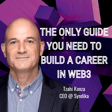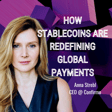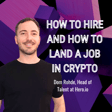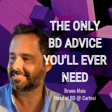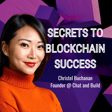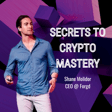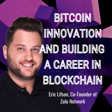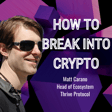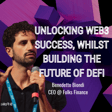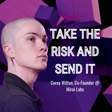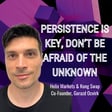Become a Creator today!Start creating today - Share your story with the world!
Start for free
00:00:00
00:00:01

Cork Protocol's Rob Schmitt's secrets to crushing It in crypto
Let's get into the world of Web3 entrepreneurship with Rob Schmitt, a serial founder who’s navigated the highs and lows of building startups in carbon markets and blockchain.
In this candid conversation, Rob shares his journey from leaving university to co-founding Cork Protocol, spilling hard-earned lessons on hiring the right team, mastering the fast-paced chaos of crypto, and breaking into the industry.
Whether you’re dreaming of launching a project or landing a role in blockchain, this episode is packed with practical advice and real talk that’ll inspire you to jump in and start building.
Transcript
Introduction and Rob's Background
00:00:00
Speaker
Rob, welcome to the show. How are you? Thank you. Good to be here. I'm good. How are you? Yeah, not too bad, thank you. Not too bad. and Rob, for people who don't know who you are, could you give us a bit of an introduction, please?
00:00:15
Speaker
Sure. Yeah, so... um I'm one of the co-founders at Quark Protocol. um And just a little bit quick background to how I got to what I'm doing now. So i started off my entrepreneurial journey in ag tech. So I was building a company within satellite data and AI.
00:00:34
Speaker
So that was around almost 10 years ago. And um i built that up over around five and half years. And then we did a small IPO. And then I i left that company to pursue Another project called Tuken that's building tokenized markets for carbon assets. So I've been working a bit with carbon assets at my first company, Biltus. And so, and I wanted to do something in like three. So I became part of the founding team at Tuken and we launched that.
00:01:09
Speaker
And that initially went like incredibly well. we have We had 100 million of TVL and volume in our markets. We actually had the, majority of all the volume in the carbon market for like two years.
00:01:22
Speaker
So, uh, it was really quite successful. Um, but then, um, this whole carbon market imploded eventually ended up leaving that. Um, and then, um, was looking at different things to, to do. Um, and I took in, been working a lot on the sort of market structure in particular, looking at sort of we were building some structured products for carbon assets.
00:01:50
Speaker
And so was quite familiar with that space and actually was kind of gravitating towards that area. And I was looking at that from like a Web3 perspective. Initially had mortgage-backed securities, but then i one area that I sort of was like discovering more more was missing ah i was doing lot research in terms of, in particular like yield rehabilitation was,
00:02:14
Speaker
um like risk management so ended up uh being part of the like basically starting port to help build out the risk management layer for crypto um and yeah so we we launched that around two months ago we have now uh close to 20 million tbl uh but it's yeah kind scanning from there sounds cool very uh very entrepreneurial journey over the last few years was that um was that always the plan Uh,
From Law and Engineering to Entrepreneurship
00:02:42
Speaker
not really. I mean, I, I started off, uh, going to uni, but, um, I, I don't really, not such a huge fan of lectures, so I, kind of didn't really like it too much. I was studying, I was in law school actually, uh, I was gonna switch to engineering, but, um, yeah, I just kind got pulled into like building stuff because that was much more interesting to me. And, um, I, it started off more sort of like side project. My first company was a side project whilst I was studying.
00:03:12
Speaker
But then it just kind of took more and more. moment i think My attention was the only thing that was really interesting me at the time. And so I just decided to drop out and pursue that. So it wasn't really planned, um but I think it suits me and my personality quite well. So when I of discovered that, I just kind of kept going.
00:03:29
Speaker
Yeah, nice. Cool. Going straight from yeah university to then running your own companies, you're definitely thrown in at the deep end. Yeah. It's like sink or a sink or swim, right?
00:03:42
Speaker
Yeah, I would say the the first um the first few years were, I would say, oh quite, shall it was super exciting and I was working me like a bunch and and we' we're making a lot of progress, but I would say the the initial period when you're coming out of university and then you initially throw it into this role of managing a raising money, managing all the accounting, all these things, like it was a lot of things to figure out.
00:04:11
Speaker
um So definitely was thrown into the deep end. But in the end, like, know, think those first few years, like I learned a huge amount. And then like from there, like now sort of being in my third third startup, but yeah no it's, it's, I'm happy I have those lessons in the bag.
00:04:29
Speaker
the bank Yeah, for sure. And is there a particular role that you tend to gravitate ah towards in those startups?
Role and Responsibilities at Quark Protocol
00:04:37
Speaker
Are you more on the idea side? Are you on the operations side? Would you be on the tech side? like Could you talk us through like what what kind of role you tend to to fit into?
00:04:48
Speaker
It's been varying a bit. I find... um It depends a little bit so the needs of the business and also the team that's around. I would say for my last two startups, I've been more gravitating towards um the product and in particular, like the sort of market design and tokenomics all these things.
00:05:10
Speaker
ah So right now I'm the co-CEO, but I'm more responsible for the the product side in terms of like how the mechanisms work, like how the the product is shaped and so forth. um I mean, I think I think that suits me more because it's more, yeah, it's a lot of kind of thinking through designs and like working with a team to build those things. I find that very rewarding to actually build a product and they create it. so It's very, very much a creative process. And um yeah, so I think that probably is the area where I'm like strongest.
00:05:49
Speaker
Yeah, fair enough. Fair enough.
Building the Right Team
00:05:51
Speaker
Were there um any particular challenges that really surprised you throughout that entrepreneurial journey just weren't expecting? Yeah, I'd say um one of the areas which I find like and over time I've started to appreciate more and more, own which I think is one of the most important pieces, which is to build the right team. like To be honest, I think that's something which i used in my first company I did a lot of mistakes in terms hiring And it's not to say that, you know, not making mistakes today in terms of that, it's like, you're never going to have like a flawless track record because you have imperfect information and when you bring someone on.
00:06:29
Speaker
But I do think how you handle that, both in terms of spending enough time on key hires in terms of like the actual process and making sure that's how you're running through that due diligence from different perspectives.
00:06:44
Speaker
as well as if things go wrong to ah quickly take that corrective action. I think that's, you have to be, um like, I think both being diligent in terms of hiring, but also being quick to respond when you make mistakes in terms of hiring.
00:06:59
Speaker
And um kind of, yeah, I think there, it also relates a lot to, like, culture. And um I think it's quite, it's critically important, especially startups, the initial hires you make. And I think,
00:07:15
Speaker
the culture that those hires set has a very profound impact on the organization in terms of how it performs, how it behaves. And also, to be honest, the joy of working there, because in the end, I'm spending vast majority of my free time working, and it's a lot more rewarding to do so with people that you actually like working with, that you like deep respect, and that are sort of leveling the team up.
00:07:40
Speaker
And so I think that's been one thing which, um I found, I didn't think that that would be such a big piece of it. Because the end, I think if you have a, like as a startup, you have to, know, you have a thesis and you're kind of building a product and you're you're trying different things out.
00:07:56
Speaker
And you oftentimes initial idea is not the one that sticks. And so you kind of are in a position where you usually have to be very adaptive to the the market response and what the market is telling you.
00:08:09
Speaker
And I think to be able to do that well, I think you need a team that's can sort of keep executing and keep sort of iterating. And you need to be pretty tight and you need to be willing to make those changes because it's it's pretty difficult to pivot. Like, especially when, you know, let's say you've spent half a year building like one version of a product and then you find out that that's not really what the market wants and you have to like pivot, then it's sort of This is sudden cost policy is one that's difficult to deal with because it's, it's oftentimes like, you have a lot of things invested in that product. you have a lot of like both emotionally and also like, it's like actual money and customers or everything.
00:08:54
Speaker
So being able to be like agile there and having the right team that's kind of kind of follow you along and that journey is really important. yeah yeah Yeah, I think you're completely right.
00:09:07
Speaker
Obviously that's fairly close to my heart, being in in recruitment, right? and Helping founders build teams. And yeah, I think it's super important. like be quite I always say like be quite slow to hire, but quick to then make the decision on whether or not someone is going to stay around long term.
00:09:28
Speaker
and When I say slower slow, I don't mean months, months, months, but um actually taking the time to really understand like who do you want in a team, what type of person, what type of personalities, what type of background, what type of experience they need to bring.
00:09:41
Speaker
um And through the interview process, like really make sure that you're doing your due diligence to actually make sure those people are going to be the right fit. Because you're right, the first five, ten hires in a startup make or break it, really.
00:09:54
Speaker
regardless of what you're building. I think if you hire good people who can solve problems, they can pivot into anything, attack a new problem, whatever it might be. But I think if you hire wrong, it can really stunt the growth and the development of of the startup, right?
00:10:08
Speaker
So um yeah, i think you're completely right on on that. and I guess it's a challenge. You have to almost learn learn the hard way it' to some degree. um Yeah, maybe you just have to get thrown in, right? and just Exactly.
00:10:24
Speaker
I think it's sort of you have to actually experience the mistake. I think the ah to really take it very seriously, i think it's like it's one thing to hear it. like It's not that you know when I started off building my first company that was like, oh, hiring was important. like People kept telling hiring was important. But I think it's once you really experience the problem of doing wrong that you start to really prioritize doing it right.
00:10:46
Speaker
Because the cost of doing wrong, I think that's the piece that um you know think you have to really understand like if you have the wrong hire you you both are stopping yourself from getting the right person on board but also it's really like a massive drag and like both psychologically for everyone involved because you know oftentimes you will have like conflicts and those conflicts will be massive distractions in terms of your ability to focus and then in the end it becomes a massive sort team motivating factor for everyone in the team when you have like types of conflicts and you have
00:11:18
Speaker
some people don't perform well and it makes that the people who are performing well you know it's it's also a demotivator for them because then they have to carry all the weight and then it starts feeling unfair and then you kind of get like a bad dynamic and everything. So I think it sort of torpedoes the project in a sense and when you have bad hires, especially that stick around for a while.
00:11:42
Speaker
it's It's always going to suck to like you know make the cut, but ah you just have to do it. And um I increasingly think that The pace at which you move forward is sort of a function partially of sort of avoiding mistakes.
00:12:01
Speaker
And it's not to say that you you shouldn't take risks and make mistakes. You have to, to some extent, make mistakes. ah But I think if you can avoid making these types of mistakes, it saves you a lot of the pain. And I think that's where ah investing in a proper recruiting process is quite helpful because It really is like, sure it's a headache to do a long routine process and you know, you're eager to get people in because you have things to do and you need to move forward, but it's just a risk reward because if you're, know, it's a big risk that when everything is done well and because it can go quite, quite wrong. And so you sort of want to minimize risk to the extent possible. And I think it's, you save a lot of time upfront by just being more thorough in the screening.
00:12:49
Speaker
than getting the hire and having to repeat the process. Definitely. And also it costs, as ah as a young startup, costs a lot of money as well, right? Cost of a bad hire is is can be quite substantial depending on the role that that person's in.
00:13:06
Speaker
I definitely think there's enough free advice out there for creating these types of interview processes. I know a lot of people don't like to talk to recruiters too much these days because i think the recruitment industry in general has given itself a fairly bad reputation ah overall.
00:13:23
Speaker
and But there are still some really, really good recruiters out there who will give all this advice for free. you know if you preaching for your young fan and If you're a new founder and you're reaching out to various different recruitment companies that have got good reputations in the industry that you're in and you're asking them this advice, like all of them will give you free advice on saying, well, this is how you should set your interview process up. This is how you could ah choose people. this is how you should go and evaluate that. These are some questions you can ask. This is what our last 20 clients have done when it comes to hiring and that kind of thing. So yeah, my advice would be if you're new to it, just go and chat to as many people who's gone through that process as as you can.
00:14:03
Speaker
um Yeah, and you'll hopefully, fingers crossed, not always, but it will help you try and avoid some of those mistakes.
Starting a Web3 Project: Essentials
00:14:11
Speaker
here but some ah This is probably going to be quite a ah vague question or one difficult to answer.
00:14:20
Speaker
and Could you give us a bit of a crash course of being a founder in Web3? Like what components you need in place, what do you need to consider before kicking off projects?
00:14:32
Speaker
and I guess fairly high level, otherwise we could probably be here for days talking about it. But um yeah, could you give us a bit of crash course? I mean, I think to start, I think you need kind of some sort of like general problem area that you want to build a solution for that you've sort identified. Ideally something which is like somehow novel and like has a unique edge to things.
00:15:00
Speaker
Because I think doing it's, in ah in a sense, it's tricky to find something that's like truly unique because there's a lot people building and there's a lot of things that of look similar. But I think if you do have something that's more novel, think there's a few benefits both that and you have a competitive advantage because you're kind of doing something unique and then also there's the piece that it's also easy to attract capital because you have this competitive advantage and it's also easier to attract people like good people to join you um and so i think there's like one aspect to it which is the sort of idea but um i'd say the bigger part is you need to then initially find like the right sort of people to build that um so the initial like co-founders usually um need to be in place and then um either you're sort bootstrapping some initial like building some initial mvp or so forth um
00:15:57
Speaker
just with your own funds and your own time, or you raise some sort of like initial pre-seed money to to help do that. Usually you start off like building a little bit and then you raise some pre-seed money to, once you have like a few things to show ah to like build out the product fully and like launch it.
00:16:14
Speaker
I would say that's the usual process. So in it order to do so, you need to um have some skills in terms of fundraising. i think fundraising it's It's not that you have to fundraise, like there's definitely ways to build companies without fundraising, but I would say most startups end up doing some initial fundraising to to get the product out.
00:16:36
Speaker
um you Unless you're sitting on massive bags and just funders off, but like I would say for most people, especially first-time founders, you need to raise some money.
00:16:47
Speaker
and to do that ina think it's um Like you need to build and some sort of like usually like an investor deck, but like sort of presentation that kind of goes through like the describing the problem, the solution you have, like the market you're tackling, like the, like you're competitive with that, which you're tackling that market and ah the team is kind of building that out. I think basically it's like pitching the team the vision and the direction you want to go. Um, and usually you usually use like some sort of investor deck or some, you know, investor,
00:17:18
Speaker
memo or something that helps communicate that and then you just have to like talk to a fair bit of like usually a crypto focus VCs or crypto focus angels to do that but yeah then i mean to actually get the part going and started um I think in initial phase it's really important to actually validate the market that you're that you're tackling so I think Oftentimes what investors want to see is that you're able to find people on other side that are that are interested in this product.
00:17:59
Speaker
Because the the thing you want to avoid is basically that you spend a bunch of money to build a product that the market doesn't actually need or doesn't want. And so the biggest risk is really that you do that. And I think that's also why probably most startups fail is that the product they're building actually isn't really needed.
00:18:15
Speaker
And so to minimize the risk of that happening, having some early mock-up or some early like way know communicating with your building and seeing people respond to that and this is again where most likely the initial mock-up or initial idea like it's pretty often that you don't actually get good response from that and think there's a bit of like a skill in terms of understanding you know what's good or not and um like i think the mistake when people
00:18:48
Speaker
go through is that they they say, oh, it's just, you know, just because the mock-up isn't like good enough, like it's missing this feature, this feature. And if you had those things, then people would like want it. But in general, if you have something that's directionally very interesting to people, that there's a big need there, like they're going to see past that and be like, okay, we we want this, we're interested to to talk to you, like, and we're interested to like explore this further.
00:19:11
Speaker
And so if you're not getting those types of responses, like if no one's interested in what you're doing, i think that's a good sign that you should not do it. Because in the end, like you don't want to just build a startup for the sake of building a startup. It's just like, it's it's not such a, like, I think it's it's worth, it's it's a lot more fun to do it when things are going well and when you're doing something that actually, like, works out. Because the the process of, like, building something up and then, like, it not working out and then having to up on this, you know, I can't comprehend.
00:19:44
Speaker
Yeah. Yeah, I guess that's non-glamorous side of being a founder, right? the ah That people don't see or don't hear about that often.
00:19:56
Speaker
Yeah, it's I mean, I would say it's ah for for most people, i would say it's probably a pretty bad risk-reward
Challenges and Rewards of Being a Founder
00:20:04
Speaker
to be a founder. Because in a sense, you have um like there's there's some chance that you're building something that works out and there's like a potential very high upside that's an error.
00:20:15
Speaker
I'd say the the benefit is that in the process of doing so, even if it doesn't work out, I think you learn a lot by being a founder because you have to get thrown into all these different areas where you have to like figure things out. So I think it sort of broadens your skill sets quite meaningfully. um But, know, I think in terms of like initial, maybe like initially you're probably quite poorly compensated. You have to work quite a lot and you also face like there's, especially in crypto, there's like personal risk in terms of being a founder.
00:20:44
Speaker
Um, like cause the sort of regulatory legal side is, you know, a bit of a gray zone. And so even if you're doing things like in the best way possible, uh, you know, you could personally get like, you know, uh, tied up in like lawsuits and things like this that you have to like, you know, potentially personally deal with.
00:21:01
Speaker
Um, and could have personal liability from that. And so it's not, it's, uh, in particular crypto, it's not, not a game without any risk. Um, And yeah, I think it's also, it's not necessarily for everyone. I think it depends on the stage you are in your life and kind of what you're looking for. Like if you're looking for like a stable source of income, that's not going to be like kind of where you're going to have a great work-life balance.
00:21:25
Speaker
This is just not it. This is like if if you are hungry to like really work a lot and grind and are excited about building stuff and like you you really want to build, I think it's it's probably the the best role you can be in. But That's, you know, I think that's the type of, uh, personality that i think thrives in this title role because, um, particular particularling crypto, i think it's also a really big problem with the founder burnout.
00:21:55
Speaker
Um, there's a lot of founders that kind of go on this journey and then after one or two years, they, they just like, you know, they they get burned out and because it it is so it's a very challenging environment because there's like so many things going on. There's so many risks, there's things moving so fast.
00:22:13
Speaker
There's like so much work, like you're getting pain left and right from all these different apps. And like, it's so it's it's it can be quite stressful. So I think, yeah, I i think there's certain people it's it's a great fit for, but I think you have to really kind of look inwards and see if this is like for you, if if you're interested in doing this journey.
00:22:36
Speaker
Yeah, you're right. I guess more, well, I can probably safely say that more people make it, if you can say that, as being employed at other businesses and that kind of stuff um so than they do for being a founder, right? I can imagine you can have very, very, if you get to certain positions, you work in certain roles in larger businesses and stuff, you can have very stable, successful, lifelong careers and retire with, you know, decent cash in the bank and live a happy life. ah
00:23:10
Speaker
Whereas as a founder, I guess you're ah you're trying over and over again to make companies work. And if you're lucky, you hit one that ah does really, really well. And then you have a successful exit eventually, or you have a super successful business. But it's, um yeah, the exception and not the norm, I think.
00:23:29
Speaker
um but you really have to enjoy the journey you don't do it for the end of result right you're doing it for the journey because you love doing what you're doing and you've fallen and in love with that particular problem um and you try tons of different solutions to solve that particular problem right now that's why you do it I think if you're in in it just to make cash exit ah and then move on to the next thing make cash exit you probably get burnt out fairly quickly because you're not really that ah that into the idea, I guess, or like that into, to solving that particular problem, maybe.
00:24:01
Speaker
I'm sure there's exceptions to that, but, yeah, that's how kind of view it. I agree. And, like, for me personally, like, I enjoy the process of, like, building these startups. Like, I, I find the sort of stressful nature of it is something that, like, works well for me because, like, I, kind of, like, thrive in that sort of stressful chaos.
00:24:20
Speaker
Like, for me, it's, like, I, I look forward to that. i when I have that absence of that, I sometimes miss it. And so, um, like for me personally, it works, but I totally agree. Like, I think if you're looking to make, you know, especially crypto, like if you would join a company that's like raised their series A and you get like a decent token allocation and then they TG and like, you know, there's no, the, the, the number of people that make like a good amount of like wealth do that is much higher than like people.
00:24:48
Speaker
So I would say, but if you, if the people that are becoming billionaires, like they're mostly all the founders. And so it's, it's very binary. It's like, I think it's, uh, yeah, like I said, it's like a small probability of success, but the potential outcome there is like much higher.
00:25:07
Speaker
Um, so i think it just depends on like, know, what you're looking for, but I, I think if, if you enjoy actually doing the work, um, and you enjoy sort of the whole process of it, then It's not really coming at a cost.
00:25:23
Speaker
It's like, sure you have all this risk and so forth, but it's, um, it's, it it can be highly rewarding. Like if you're the type of person that enjoys stuff, um, and I think it can also set you up well, in terms of like future career, because you end up, um, having to do a lot of things and learning a lot of things. And so I think like the, the skills that you build and the connections you build and so forth, uh, can be quite valuable. Like there's lot of people who start up as founders and then,
00:25:50
Speaker
They you know take like an executive role at some you know larger company later. And so that's how they eventually end up making the money.
00:26:01
Speaker
and So that that's also what it has. It doesn't always have to work out. Do you think now you've founded three startups, you've made yourself almost unemployable, like going back to ah looking at someone else's vision, implementing someone else's plan, that kind of thing?
00:26:19
Speaker
Yeah. i mean I'm not sure, I think, for example, my my last startup, like there, it was sort of, I technically joined the initial founding team there, so it wasn't ah like, and and then there I was the CEO, so it was more like implementing the the person i was initially starting it, but I was part of a founding team, I'd say in terms of the strategy and direction, but it was still more like helping ah make that vision come to life.
00:26:49
Speaker
So I think it's not that i have to be in this role, but yeah, I think i need, I think it's helpful for me to have like a say in terms of how things are kind of done because I usually have an opinion.
00:27:06
Speaker
So I think that's, ah I'm sure I find it be unavoidable, but I would definitely want to work under the someone where like I need to respect them and where I do have some say in terms of like,
00:27:20
Speaker
my work like i think go to work like i take a lot of accountability and think for a person like that it's hard to just like you know not have any say in terms of how much sort of um like yeah but to be the same time i can see myself you know having a normal job at some point in the future but uh we'll see maybe i'll just keep finding companies yeah nice nice yeah that's that And you um you spoke about it a little bit there, about how there are some differences being crypto compared to being a more traditional tech um tech companies and things.
Industry Dynamics: Crypto vs. AI
00:28:02
Speaker
um
00:28:03
Speaker
Is there anything that you really think people should know about the the blockchain industry before joining it?
00:28:12
Speaker
I think it's really fast paced. So think tech in general is relatively fast paced and there's certain pockets of tech that are very fast paced. I'd say down like some friends are working in like the AI space and but say there's like more similarities in terms of like the AI space in crypto than I would say, you know, if you're doing like a company in crypto, because crypto, it's really moving very, very quickly and you have to be moving at that pace.
00:28:39
Speaker
And I think that manifests itself in general. So for example, when you're like you're doing some sort of deal or something like it's just you're messaging really quickly between each other you're closing things very quickly and you have to stay on top of all these different things happening ah so fast and um like think that's how that manifests itself is that you know like if you look at any like most people work in crypto like their telegram just be like you know it's just a wild mess like it's like so many like different like and messages and constantly things to stay on top of. then on top of that, you have like Slack and you have your email, such as your Discord.
00:29:16
Speaker
So it's it's a lot of um it's It can feed like and on the inside, it just feels like kind of chaos to some extent.
00:29:27
Speaker
But when you zoom out and you actually look at the progress that's being made, like in like a year, like a year crypto feels like, you know, several years in like non-crypto.
00:29:39
Speaker
kind of it's it just, you're moving so quickly that, um, you know, you do end up making a lot of progress, which is exciting, but I think that's also where, like this eventually comes out costs.
00:29:49
Speaker
Like it ends up being that you spend a lot of time, uh, glued to a screen and, uh, you oftentimes like the hours tend to be pretty long and people tend to like outside of their normal working hours, you're still like responding messages and the weekends all forth. So, um, yes, um,
00:30:07
Speaker
Like the work-life balance, I would say tends to be maybe a little bit worse in crypto than I would say in other industries for that reason. But at the same time, have perhaps more flexibility. Like crypto tends to be like remote first and most like crypto companies are distributed and all the communications is async. And so that feeds into this sort of communications burden, but it also means that you can You know, like a year ago or so, I was like two months in Australia and working and it was fine. Like it was not a problem. Like you can just do that. Like people tend to like shift around and move around.
00:30:47
Speaker
I think that for some people is great, but it's not very long. Yeah, it's good to understand. So I remember when I, so I've been recruiting into Web3 now for maybe four years, four and a half years, something like that.
00:31:00
Speaker
And I remember when i made the switch ah across and I was used to very, I say traditional recruitment, but just, yeah, in non the non-crypto world.
00:31:12
Speaker
And that was tons of meetings. There was lot of face-to-face stuff. There was also a lot of calls, a lot of email and recruitment. There's a lot of cold calls and just ringing people's mobiles and that kind of stuff.
00:31:25
Speaker
You come across into into crypto, blockchain and stuff, and it's, the communication style switches. And it does take a little while to get used to that. So you're on Telegram, you're on Discord, you're on Twitter.
00:31:37
Speaker
Everything is acing. People's mobile numbers aren't free there. They don't have a work phone at a desk that you can just call through to their work line um that we used to do, obviously, in in in like Web2 agreement and stuff. So even from, and I'm not necessarily working in it on a particular product, but even the communication style from someone who is a service to the industry, even that has to change and you have to get used to that. And it is it is a it is something that takes a little bit of getting used to.
00:32:08
Speaker
um And again, yeah, my telegram, again, equally is hectic. think every day you wake up to 80, 90 unread messages and stuff and, yeah, it gets quite crazy at times.
00:32:20
Speaker
um So, yeah, you're right. It's definitely something you need to be aware of before joining the industry.
00:32:27
Speaker
I think you adapt to it and you kind of get used to it and sort of I think, it become it's become, like, normalized in the space but I think for someone that's, like, not used to it, I can i can imagine it being, yeah,
00:32:40
Speaker
And for me personally, when I is first started, I was just like, how do manage this? I think you need to you need to have some discipline in terms of particular like notification management is, I think, very important. i think um because because there's so much work and so much stuff going on, it's like you you need to find space to like unwind and disconnect from all that.
00:33:01
Speaker
And I think it's very difficult when you're like, everyone's working across different time zones and they're messaging you like, all the time. Like if you don't turn off all the notifications and find ways to like escape all that, it's like, you're going to be bothered and think about work all the time. And I think that's like not viable long term.
00:33:19
Speaker
Yeah, I think you're right. For me, it's, I've become obsessed with Paddle recently. Paddle, I'm not sure if you've played. Yeah, it plays a lot. But yeah, that, that, is now my new personality pretty much. And I do that like four times a week. So, uh, that's like the switch off point in the morning. So I tend to, so I live in, um, Southeast Asia and and a lot of people I speak to are either in, uh, like the U S or in, in Europe.
00:33:44
Speaker
Um, so actually I have a slot in the morning. That's like a couple of hours. That's just no one, either people aren't awake yet or they're not talking to me or messaging. So it's that kind of switch off time that luckily I have that that kind of hourly, a couple ahile window. But I think, um,
00:33:59
Speaker
Yeah, turning the phone off and getting away from it. ah Easier said than done when you got loads of stuff to do, but I think it's definitely important to do that.
Advice for Entering Blockchain
00:34:11
Speaker
but some So say if someone is looking to break into blockchain, get their first role in the industry, they don't want to be a founder.
00:34:18
Speaker
They're looking for an opportunity to help projects. Is there almost like a step-by-step guide you could give them on how they could break in and get their first job in blockchain?
00:34:31
Speaker
I um, so breakdown blockchain into, uh, sort of which category of sort of this blockchain industry you want to, to work in. Cause like blockchain at this point is like a massive industry. Like there's, you know, like the market cap like three and a half million. Like there's so many different like areas. There's, I would say a fairly big difference if you're working on, let's say, you know, like you're building like a layer one or you're working in DeFi working in like, you know, it's like,
00:35:00
Speaker
and if these are institutional stuff, like it's, it's a fair bit of like differences there. Um, and, um, so, you know, would probably like to find one area that, um, that you're maybe particularly interested in.
00:35:14
Speaker
and i think the first part is like actually understanding the space and understanding what's going on. Um, I think it's, it's, if you have, um, an understanding of the space and like, like the dynamics and actors and,
00:35:28
Speaker
like how the protocols work and so forth, I think meaning i think it's very helpful in terms of actually getting a good job. And i would say it's not necessarily a prerequisite.
00:35:40
Speaker
Some people do get jobs and then they learn how to jobs, but I do think it gives you a massive edge in the rhythm process because it's also something which like people tend to be looking at themselves um because it's very helpful, especially, let's say you're trying to join a startup. like It's very helpful for us to like hire people are like actually interested in what we're building.
00:36:03
Speaker
Um, because you know, then they were like crafts and like help like shape things in a way that makes sense. And like, they're they're more like, let's say personally like interested in motivated. that So I'd say finding the bucket in crypto that's appealing to you and, uh, going deep into it.
00:36:19
Speaker
Um, I think that helps a lot. And then, um, you can like how I initially got started was just like helping out. Like I was, um, Like but with the, the, my last, like there initially i was like and just I just helped them for free with a bunch of stuff.
00:36:39
Speaker
And I've been helping for free in like a few other projects as well. Cause oftentimes you have, like a discord where, you know, there's like a community program and you can do various things for the community.
00:36:51
Speaker
and oftentimes these organizations are like semi open where there's like a lot of things in the periphery of the organization that need to get done. And so if you just are an active participant and like, you know, meaningfully contribute and like build relationships with the people on the team, I think that can also give you an edge in terms actually joining those teams.
00:37:10
Speaker
And I think in the process of doing so, you make connections, you like learn how the the space works, how it operates. And so all of this, like what I'm saying, I think you can do like probably in your spare time with, let's say, a normal job.
00:37:24
Speaker
And then, think, you can like, then it's like applying for jobs. But I think just applying randomly for jobs without having any experience or any knowledge of of crypto, I think is unlikely to be successful. Like, I think the you're much more likely to be successful if you started helping out the projects. And you could also show that, ah because then, you know, to any potential recruiters and so forth they will see like, look, this person has contributed here and here.
00:37:53
Speaker
In the interview, they can like speak about their experiences and so forth. And I think it shows like initiative, shows interest and I think that's super valuable. So to me, that that that's probably where we can start like the learning and figuring out the right area and contributing then from there.
00:38:12
Speaker
income Yeah, I think that's that's really good advice. I think you're yeah completely right on the fact of like learning and and and even giving some of this stuff a go. It doesn't have to cost that much money. You can spend $5 or 5 euros, 5 pounds, whatever it is, um you know buying some kind of... They say buy...
00:38:35
Speaker
get some some USDT or USDC and then you can swap it into Bitcoin or Ethereum or something, or you can just have a play around with some of these DeFi protocols. For example, if you look into DeFi space, actually just give it a go. You'd be surprised how many people I speak to who go, yeah, I really want to get into the industry.
00:38:51
Speaker
I go, right, cool. Like what stuff do you do on chain at the moment? you trade, you stake? Like what do you what you do? And they go, oh no, I wouldn't put my own money into it It's far too risky. And you're like, d do you really want to join the industry? Probably not.
00:39:04
Speaker
ah The amount people that don't have a wallet just don't have wallets, for example. They've never used MetaMask or all this kind of stuff. And to me, that's crazy. If you're actually trying to break into an industry,
00:39:16
Speaker
ah you're going to try and use the products, right? like That's just just common sense,
Building a Career in Web3
00:39:22
Speaker
would have thought. but um But yeah, and then getting involved in the community.
00:39:27
Speaker
could be quite yeah I think that can be quite difficult to do because there's so many projects in communities now. It is tough to to work out where you want to be, like what what communities you want to join, what you want to be in, because I guess it's very difficult to manage.
00:39:42
Speaker
Let's say you're looking for a role, you want to try and speak to as many projects as possible, right? So 30, 40, 50, thirty forty fifty projects you might try and speak to to try and find a position or something trying to get involved in all those communities can be can be tough um but i think to echo what you said i think it is super important to build the relationships within the teams and things because you never know who they're gonna then intro you to or refer you to and that kind of thing. So space is run on referrals and networking, you know, from a jobs perspective.
00:40:15
Speaker
So I think, yeah, you're right, like getting involved in a few of the big communities, the projects that you really like the look of, get involved, chat the team, chat to other people and you'll, I think just over time, you'll be introduced to opportunities and roles and and that kind of stuff.
00:40:32
Speaker
Yeah, totally. Yeah, think a lot of this happens and, yeah, I'd say a lot of this happens in discords, I would say like kind of just, you can join the discords and then you can also find like which communities you can apply with because every community has their own flavor. I'd say sometimes you just find one where it like resonates personally with you. And I think there you will probably get more successful in terms of like building those connections.
00:40:56
Speaker
Um, yeah, like on what you said with the also trying to get tools out, like I, I almost always ask this one. like hiring someone is like kind of what what their favorite tools are and what they're using. And if they're not using any of the tools, it's like, it's like a really big red flag.
00:41:10
Speaker
i find also personally, like if I have like some amount of money involved in these protocols, it it changes also my incentive to learn about them. Because once you have money in the line, you kind of like,
00:41:26
Speaker
It's ah to me, there's just no bigger motivator to actually start learning these things. Um, so I, I do think it's like a really good recommendation to like, but I mean, it doesn't have to be like all you want. It can just be like something where it would like hurt to lose it.
00:41:41
Speaker
Um, like if that's a hundred dollars for you or it's a thousand dollars or whatever it is, like as long as its like i think a little meaningful i think it's helpful just start off with like a few dollars tested but then I think if you really are trying to use the money in the protocols, it forces you to be like a smart participant. And I think by being a smart participant in the space, you really understand what's going on. And I think if you understand what's going on, I think it's much easier to to kind of get a job.
00:42:13
Speaker
Yeah. Yeah, I agree. I agree. So if someone is already here then, they're working for Protokol, they're with their favorite project, how do you ensure that you can build a successful career?
Personal Branding in Web3
00:42:25
Speaker
How do you make yourself indispensable to founders? mean I think like one strategy, which is pretty common is to build your own persona and like your own network. I think that becomes quite valuable.
00:42:41
Speaker
um it's very valuable for the project as well, where most projects will like, help try to help you build out. Usually this is on um X or Twitter, like, uh, like most companies, but like want you to have a persona there and like actively be like participating conversations and like speaking about like, you know, what you're working on, like, like the general area you're in, like having opinions and trying to like come up with Peter.
00:43:05
Speaker
I think once you have, uh, built a bit of an audience there, um, I think that can be like a really powerful platform. Um, And I think it also becomes a powerful platform and then in terms of like, you know, cause that will like stick with you like from one job to another, like, so you can use that as a, um, sort of distribution point, both for your own career and for, for the projects.
00:43:30
Speaker
And then that makes you valuable and the larger your distribution is the more valuable that sort tool becomes. Um, and it gives you then connections to like, you know, various other opportunities that align both personally and for the project.
00:43:45
Speaker
So i would say that's, that's one that's really important. I think in general, like I think with, with all organizations and I think this is not just unique to cryptos, like if you're kind of delivering lot of value, I think that in the end gets reflected in usually your role and earnings.
00:44:05
Speaker
I think it's sort of a, it's it's not like a one to one relationship where like more value you deliver that's always means you will like earn more and have a like higher up role but I think you know like if you end up doing a lot of important work and you deliver a lot of things people start relying you more and more and then because people rely on you more and more you come have a heavy weight in organization and that sort lifts you up and I think it also builds your reputation because like then in the future when people do reference check and so forth like they will they'll see like okay this person is like really
00:44:41
Speaker
like, something good that you want on your team. So I think, in general, just kind of doing as much as you can. And I think that's also one the nice things with crypto is, like, you it's an environment where oftentimes there's, like, an infinite amount of work to be done.
00:44:56
Speaker
There's so many things that have to happen. And if you really want to grind, it's like, I don't know if there's any better place to be than in crypto because there's just so much stuff you can do and you can different things forward.
00:45:09
Speaker
And most of these organizations are also relatively immature and you can help build out the processes, you can help out sort of getting your organization to the next level and I think in the process of doing so you become indispensable.
00:45:22
Speaker
So I think that's our recommendation. Yeah, and really good recommendations. I think adding the value, adding as much value as possible is key there. And you're right, like there's so much that you can get involved in. like if you Even if you're on the the tech side, but you can write some cool blog posts, you can, as you said, get your social media presence up and and running. You can add value by raise raising awareness of the project.
00:45:48
Speaker
um You can do that in any any role as well. you know if you If you're really into the project and you're writing cool stuff, and you're writing blog posts and tweets about it and LinkedIn posts, like all this kind of stuff, like that's um' such an easy way to go above and beyond the team.
00:46:05
Speaker
But so yeah, ah yeah come completely right. And then purely from a job hunting perspective further down the line, one advice always say to people, just to mirror what you said is yeah build your own network.
00:46:17
Speaker
Because most roles, I would say, i don't know what the stat is in terms of a figure, but I'd say most roles in Web3 get filled through people's networks, referrals, this kind of thing.
00:46:29
Speaker
I'm sure a few get filled through job adverts and that kind of stuff, but we're not great in Web3. getting our roles really visible to people in the market and people don't like being that visible either.
00:46:39
Speaker
You know, the team members and and teams and projects are buried in Twitter, Discord, this kind of stuff. They're not out there applying for roles and that kind of thing. So I think if you're you take the time to build your own network, and again, this is also good for trying to break into the space as well, really, but yeah, just building your own network and your own presence online and that kind of thing can really, really help when it comes to getting roles now, but also, you know, future career development stuff is, yeah, it's a bit of a life hack, I guess, for getting roles in Web3. Yeah, just to kind of like double click on that, I think the the sort of network piece, I think, especially in terms of hiring, I think it tends to be a really, really important tenant.
00:47:23
Speaker
I think the the reason for this is because I think in crypto you end up having fairly low level of trust when it comes to cold outreach and just people like applying that you don't know.
00:47:34
Speaker
And this is because there's such a high incentive for people to try to exploit you in different ways. And so as like a founder, you're constantly personally targeted by very sophisticated attacks this is like you know it's it's like it's a constant threat and so this means you become quite like defensive when it comes through that call up breach and you pay usually a premium to people that cover the references and that you actually know.
00:47:59
Speaker
In terms of recruitment, it's like there's constantly if people from like North Korea trying to get into your team. There's like people are trying to send you CDs and and the c yeah you can't download files because the files could be you know exploit your computer. Everyone's trying to like get access to your your funds, get access to your multisig and all these things. So you have to be kind of paranoid to make it that um I think that's part the background why I think this industry is, is really, it's like a big village, like, you know, go with all the conferences and everything and it's like the same people over over and over again. And, um, I think a lot of things here happen based on on referral. Um, and so, yeah, I think, you know, the quality of your network therefore becomes like pretty big for me.
00:48:49
Speaker
Yeah, for sure. And even as, as a founder as well, if you're looking to try and raise, uh, raise money and that kind of stuff. I know a lot of VCs will not look at projects if they don't have some kind of referral into the VC from someone they trust, they know a project they worked with, whatever it might be. It'd be super difficult just to raise money without any network or any reputation, just like cold pitching.
00:49:15
Speaker
right So I guess it even spreads out, that ethos kind of spreads across all areas of the industry.
Web3 Hiring and Long-Term Career Growth
00:49:22
Speaker
Yeah. it said So we we briefly touched on it and and you mentioned at the start, like how important it is and the lesson that you learned about hiring the right team.
00:49:34
Speaker
Is there any advice, let's say, if someone is looking to hire team, they're a first-time founder looking to build good teams, looking to find the right people. ah How do you do it?
00:49:44
Speaker
How do you find the right talent? any Any tips you can give? I mean, I think a big part of the the challenge is to know what you're actually looking for.
00:49:54
Speaker
and I would say like that's something that you have to kind of look at usually within like both from personality perspective, defining your organizational culture and figuring out what type of people you want to have in your team.
00:50:09
Speaker
Because I think that's like another, like a really important angle to it. It's not just like competency. I think the so soft skills and kind of how people are personally, and the culture you're building, think is also critically important.
00:50:24
Speaker
So I think that's one thing think that's really useful to define. Then particular the for the role, of like figuring out what the actual requirements are. And this is like not always very trivial, but yeah, oftentimes as you go through the process, like if you haven't really thought this through, not like changing the requirements. And I think that's like kind of throw off the recruiting process quite meaningfully. So I think having those things done right from the start is I think the building block.
00:50:55
Speaker
Then thereafter, like it depends on the role, like how long you're going to find someone for this role. If it's maybe someone that's more community oriented, might come more through, let's say your community. If it's something that's more like, let's say a CTO or something, you might, or some sort of executive role, you might look more at, I'd say there tends to be a benefit to to use like recruiters.
00:51:19
Speaker
And then if it's something that's like somewhere in between, um you can kind of go either way, trying to, like I'd say with all like all the different roles we talked about before, I think the the personal network is usually like where you start. So you start with reaching out through your network and network of the people in your team.
00:51:42
Speaker
You can have referral bonuses, things like that to help amplify network. that's in your network but then like you've exhausted that resource then i think You know, you can do like job job ads like certain roles you could use for example like LinkedIn or cryptocurrency jobs and food jobs, etc. like there's a few of these platforms that um are decent, I would say.
00:52:10
Speaker
I had some success with those, but you know, I'd say most of it personally has probably been through personal network and recruiters and then like that's probably the I would say the personal network is maybe like half and then recruiters maybe like 30% and like 20% of us being through like ads and so forth, which is a big contrast to in previous, I don't know, I think maybe it's always like that to some extent, but I'd say in Web2, it tends to be a little bit more towards like the traditional recruitment process where you have a job ad and you filter through people and kind of go through process as they
00:52:52
Speaker
That's probably slightly de-emphasized in my opinion with your network Yeah, I think that's good advice. yeah i think that's i think that's good advice um Yeah, there are definitely some roles that you never need to speak to a recruiter about realistically.
00:53:08
Speaker
um Some you should always be able to hire hi yourself. like You should really only need to go to recruiter when you're struggling to find someone directly through your own network, through the team's network. um Because you're right, like that's a super powerful tool.
00:53:21
Speaker
If you can get that get that process running effectively where the team are reaching out to people, the team would know people through friends of friends and that kind of stuff. You can get referrals through that. As you said, you have your referral scheme and stuff in place ah for team members.
00:53:36
Speaker
I would imagine 90% of roles you could probably fill through that. And maybe the odd position that is um more difficult to find where you need someone who's like diving into the passive side of the market to really headhunt some talent from her another project or something, right? Like more of the senior roles, like lead engineering roles or direct marketing stuff or, you know, those types of, those types of positions.
00:54:02
Speaker
Um, But yeah, i think I think that's good advice. um Yeah, it's useful to understand the difference, I guess, between the traditional recruitment and Web3.
00:54:13
Speaker
I think there's a common theme here. We've spoken about it quite a lot, but your network, building your network is everything, isn't it, really, in Web3? Off the back of this conversation, I mean, it's clear it touches across every single every single part your career as you go through through the space, but...
00:54:33
Speaker
yeah definitely yeah I think it, yeah, I think from a career building perspective, I think it's incredibly helpful. Yeah. And it's, it's always like difficult to find a tie to like prioritize it. I think certain roles you end up doing is more than others, but yeah, I think it gives an edge of Stephanie.
00:54:54
Speaker
Yeah. not high school to, to spend at least some time. It's like, I think it doesn't have to be the, you know, your, your main, focus, but I think spending at least like, you know, one or two hours at least like per week, you know, amplifying your network and like having your presence is, you know, quite useful.
00:55:17
Speaker
Yeah, for sure. and So Rob, I'd like to ask this question to everyone who he joins a podcast just to to finish up. you have any parting words of wisdom for people listening?
00:55:33
Speaker
Um, I think to me the, I think taking the long arc of the career is probably something I, I tried to think a lot about this in terms of what I spent my time on and, um, like where I'm involved and it is to look at it from more of a long term perspective of what I'm doing now, like how that's building towards the future. i think in particular when you're looking at but example If you want to eventually have some sort executive role in that space, the first thing you need to do is really understand that well and you need to learn a lot in terms of building a network and then eventually I think you can get there.
00:56:16
Speaker
So I think taking that longer term like horizon into mind, I would say that to me that's super important. and For me, what that oftentimes comes down to is um learning as much as possible is super valuable and um being thrown into situations where you're forced to learn a lot of things is is very valuable.
00:56:40
Speaker
I think in a moment it can seem like, you know, oftentimes like difficult to to do all these things that are new and novel and so forth. but i think taking up lot of new things blu lot things I think english it pays off over time.
00:56:55
Speaker
And so to me, that's something I try to like ah optimize for learning, at least I think early you want to optimize for learning. And I think at the later stage, you might have different priorities, but I think if you take the the long-term view, I think that becomes super important.
00:57:16
Speaker
I like it. Yeah, well, thank you. Thank you very much for for the advice.
Follow Rob and Quark Protocol
00:57:21
Speaker
Rob, really enjoyed the conversation today. Thank you for taking the time out to talk us through your journey and yeah share your advice on breaking into the space, building career here.
00:57:31
Speaker
If anyone's listening and they have any extra questions, they want to find out more about you guys and and and what you guys are building, is Twitter the best place to to find you? Is it LinkedIn? Like where can people go to find out more?
00:57:45
Speaker
and It was a pretty good conversation. sort To find me on X or Twitter, it's at corkrob, and what we're building is corkprotocol, so it's at corkprotocol. So please follow us through and get a step straight to Twitter.
00:58:04
Speaker
Great stuff. Well, yeah, Rob, thank you very much for taking the time to have a chat. Really enjoyed it, and I'll catch up with you soon. like Thank you. Thank you.
